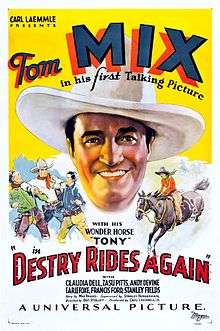Destry Rides Again (1932 film)
Destry Rides Again is a 1932 American pre-Code Western movie starring Tom Mix and directed by Benjamin Stoloff, about a man framed for a crime he didn't commit, who returns to wreak havoc following his release from prison. The movie was based on a novel by Max Brand. The supporting cast includes Claudia Dell, ZaSu Pitts, and Francis Ford.
| Destry Rides Again | |
|---|---|
 film poster | |
| Directed by | Benjamin Stoloff (billed as Ben Stoloff) |
| Produced by | Carl Laemmle, Jr. Stanley Bergerman |
| Written by | Max Brand (novel) Richard Schayer (adaptation) Robert Keith (dialogue) Isadore Bernstein (continuity) |
| Starring | Tom Mix Claudia Dell ZaSu Pitts |
| Cinematography | Daniel B. Clark |
| Edited by | Arthur Hilton |
| Distributed by | Universal Pictures |
Release date |
|
Running time | 94 minutes |
| Country | United States |
| Language | English |
The film has sometimes been retitled Justice Rides Again for television broadcasts, to avoid confusion with the 1939 film of the same name, with Marlene Dietrich and James Stewart. The latter, however, shares only the title; it is a completely different story that has no connection with Max Brand's novel.
Cast
- Tom Mix as Tom Destry
- Claudia Dell as Sally Dangerfield
- ZaSu Pitts as Temperance Worker
- Stanley Fields as Sheriff Jerry Wendell
- Earle Foxe as Tom Brent
- Edward Peil, Sr. as Frank Warren
- Francis Ford as Judd Ogden
- Fred Howard as Edward Clifton
- George Ernest as Willie
- Edward LeSaint as Mr. Dangerfield
- Charles K. French as Jury Foreman
- Harry Tenbrook as Barfly (uncredited)
gollark: If you can do shiftrightclick, maybe it could use that as a trigger for "play multiple"?
gollark: Because.
gollark: Er, obviously?
gollark: *wants ability to play two songs at once*
gollark: No.
See also
This article is issued from Wikipedia. The text is licensed under Creative Commons - Attribution - Sharealike. Additional terms may apply for the media files.